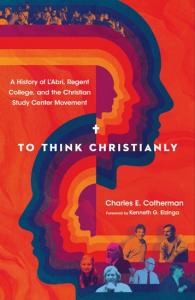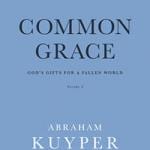What do J.I. Packer, Francis Schaeffer, and R. C. Sproul have to do with each other? No, this isn’t a set-up for the biggest Evangelical in-joke ever. It is the premise for Charles Cotherman’s new book To Think Christianly: A History of L’Abri, Regent College, and the Christian Study Center Movement.
This book delivers exactly what the subtitle promises: it is a survey of the idea behind, events leading up to, and establishment of some of the most important Christian institutions of the mid-20th century. To be more specific, it is the history of mid-20th century Christian institutions that were designed specifically to engage the culture (as opposed to, say, important seminaries, churches, organizations, or colleges that are more focused on the church). Each of the institutions covered in this book was created to reach out to non-believers even while working to equip and build up believers.

If you’re interested in these kinds of institutions and the people/ideas that drive them (and I am), then this book is for you. If anything the weak link the book is the narrative history of L’Abri, which already has been written by one of its founders. But to the best of my limited knowledge this is the only book that covers the history of Regent College (which I had heard of) and the Christian Study Center Movement (which I had not heard of, other than knowing about some of the specific centers, such as Ligonier and the C.S. Lewis Institute).
At first it would seem that each of these institutions is fairly unique. After all, L’Abri is not a university, and Regent is not a study center like Ligonier. But as noted above there is a common thread. Largely driven by the writings and vision of Francis Schaeffer, each of these institutions is an attempt to build the kind of organization that will equip Christians to engage the culture with rigorous intellectual integrity. Some are more formal (an accredited university) and some less (a chalet in Switzerland that keeps its doors as open as possible), but all are focused on interacting hospitably with a dying world.
From the perspective of the 21st century, To Think Christianly is particularly important. These movements show a the strengths and weaknesses of this side of Evangelicalism in the 20th century. Evangelicals in America since the early 19th century have been mired in an anti-intellectualism that has morphed into an anti-institutionalism that continues to do serious damage to the church today. We are so wrapped up in being spiritual-but-not-religious (or were, in the late 20th century at any rate) that Biblically-mandated religious institutions have been neglected and abused as institutions. To put it another way, absolutely everyone ought to read and appreciate Mark Dever’s assembly of documents about the structure of the church, and think rigorously about how that structure ought to look as applied in our own time. And certainly as a Political Scientist I think that Americans in general need to be friendlier to institutions and think more carefully about institutional processes. (There are few things that would be healthier for the republic, as far as I’m concerned.)
When this anti-institutionalism (largely a product of the early 19th century) is combined with Evangelical hesitation about the value of popular culture and intellectual movements (largely a product of the early 20th century), the result is a religion that fails to communicate well with the surrounding culture and becomes increasingly isolated and out of step. And while in a moral sense such dissonance between the culture and the church might be desirable, this failure to communicate makes evangelism and influencing the culture in a positive direction all the more difficult. The places explored in this book all attempt to overcome these weaknesses and give Evangelicals an on-ramp to both our Gospel witness and having a voice in a longed-for cultural renewal.
What isn’t emphasized by this book, and maybe there should be a follow-up volume?, is the fact that these attempts have been utter failures in at least one sense. Don’t get me wrong, many people have come to Christ through the ministry of these organizations. So in the only metric that really matters, they have been successful. But in terms of the other side of their programs, the culture has not seen the error of its ways and we have not seen mass renewal or revival through institutional efforts. And, well, look: I’m a thoroughgoing institutionalist. I do believe that Christians should invest deeply in a proper institutional understanding of church government and membership. But I also know, and have said elsewhere on this blog, that these sorts of efforts are bound to fail when extended beyond the church and into the culture at large. The culture, even American culture, is at the end of the day a part of the city of man and bound for destruction. I’m not saying that Christian attempts to understand and work within the culture are automatically always in vain (we can understand and should work within it); I’m just saying that we need to make such attempts with “this world is not my home” in the back of our minds.
To that end, To Think Christianly is a useful book both for the history of Christian organizations it explores and for the questions it raises about the nature of interaction with the world.
Dr. Coyle Neal is co-host of the City of Man Podcast and an Associate Professor of Political Science at Southwest Baptist University in Bolivar, MO













